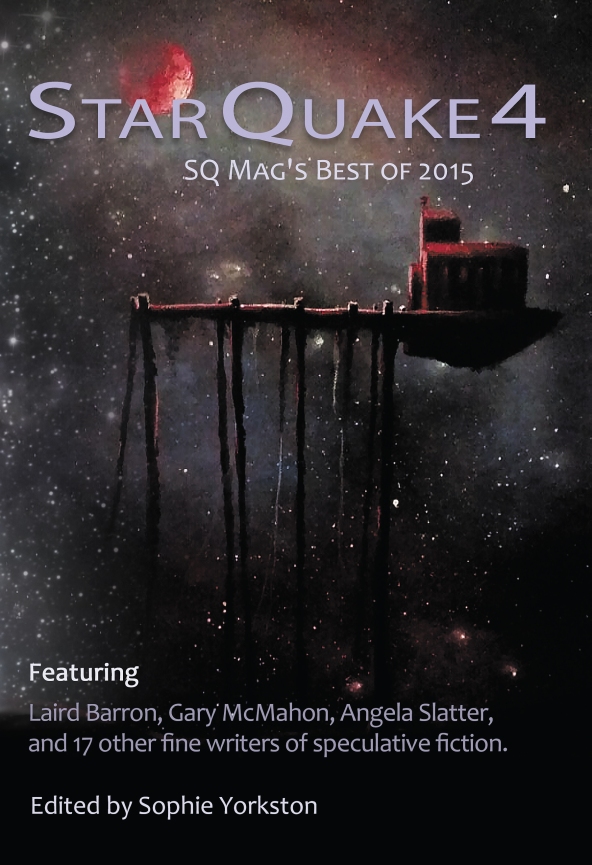Edition 28: Daemiel Watches by Cynthia J. McGean
![]() An old world sacrifice means Daemiel can eat. But the eyes watch and the child squalls, awakening memories in Daemiel long forgotten. Cynthia McGean draws us into long forgotten traditions in this dark, fantastical tale. -SY
An old world sacrifice means Daemiel can eat. But the eyes watch and the child squalls, awakening memories in Daemiel long forgotten. Cynthia McGean draws us into long forgotten traditions in this dark, fantastical tale. -SY
High on a cliff, a man and a woman stand beneath a lone tree, its center sliced with an ancient, charred wound. The clouds roar. A distant flash of light shoots across the sky.
In her arms, the woman cradles a small blob with red hair. “How will this put things right?” she asks the man.
“It will quiet the gods,” he says. “Just leave it!”
The bundle in the woman’s arms screeches. “Hush,” she whispers, frantically bouncing the little shape. “You’ll make them angry.”
Wind shreds the outlying bushes. Fat raindrops explode around them. The man snatches the bundle. “There’s no more time,” he exclaims.
He scales the tree and deposits the wailing blob in the crevice of the tree trunk. Lightning whips across the abyss of sky. The man slides out of the tree, grabs the sobbing woman by the arm and pulls her with him back down the cliff.
Crouched in the nearby briers, drawn by the smell of the coming storm, Daemiel the monster watches it all. In the bushes behind him swarm the demons, piranhas of the air, quick and light, with hummingbird wings and razor-edge teeth. Like him, they have been waiting to snatch the prize the humans would bring.
Daemiel’s breath quickens. When the storm is over, the air demons will swoop down on the child in a feeding frenzy. If he strikes now, the prize is his. He rises up out of the briers and oozes his way into the open, his thick, sinewy arms hanging to the ground, his skin glistening like algae on a stagnant lagoon. Great sheets of water pour across his lumpy head and down his scar-rutted back. Above him the clouds roar again. The sky flashes white. Daemiel flinches, but no blazing knives strike him. A giggle sloshes at the back of his throat. Let the sky gods growl and spatter! What does it matter, since they have no claws?
He lumbers across the open space from the briers to the tree. The nearness of his goal makes him shiver. His mouth waters. With a powerful burst of muscle, he wraps his fists around the branches of the tree and swings himself up into its lap. He snatches the child in his rubbery arms, leaps down from the tree and lopes away to his cave. Small, shrill screams echo across the gorge and into the waning storm.
~~~
Deep in his hidden cavern, Daemiel stares at the infant laid out on a slab of rock, its mouth gaping open in a wail, its face lumpy and red like a raspberry. He wants to tear into the tender flesh, savor its juices, but the eyes! The eyes in that squalling berry face stop Daemiel cold. They stir something deep in his memory—the smell of burning wood, the crack of lightning, the howl of a long ago storm, the sound of his own forgotten terror.
If only it would stop screeching! The piercing howls bounce about in his brain. Cursed, screaming morsel! He should just bash its head against the wall, but those eyes—! Daemiel covers his ears and paces the length of the cavern. Did he brave the wrath of the sky gods and the air demons only to taste ashes? He pounds his head on the ground and groans into the darkness.
The child cries for days, until its voice fades to a faint, choked chirp, like a cricket rubbed raw and sore. Daemiel can at last stand to get near it without covering his ears, to look at it, and finally to touch it. He grabs its head in one hulking, scarred hand, its feet in the other, and holds it up to the light. He turns it this way and that. The little creature whimpers.
To keep it from howling, Daemiel pulls it in to his great chest. The child smells sour and brown, but beneath the stink is the scent of flowers and sweet spring water. The pellet of its heart batters at its tiny body as if it will burst through. Memory murmurs in Daemiel’s head. He sways, and then moans, a low sound like the scrape of granite against granite. The child’s feeble bleats grow quiet. Its racing heart slows.
The little hand reaches up and claws at the air like a spider rolling from the end of its thread. Daemiel’s stomach growls. “Feed it,” he thinks.
But what does it eat? He tilts its face up and looks into its eyes. “It eats what I eat.”
Daemiel drags himself out in the muck and the downpour and searches for meat to feed to himself and the child. There is little to hunt—insects and rodents and birds, toads and lizards, sometimes a rabbit or a wild dog. The child gags on the large chunks of meat, so Daemiel forces bits and scraps into its throat and makes sure it swallows them. Whenever he can, he catches the hot blood of his kill in a piece of bark and spoons it into the tiny mouth, watching as it gulps the thick red liquid.
He keeps the baby hidden, fearful some other creature will snatch his prize away. He shoves dead tree limbs, rotted skins and old bones into a twisted tunnel of a nest. To protect it from the air demons, he disguises its smell with the mud and slime that cover his own skin, slathering the sticky mess across the child’s face and body. But beneath the mossy stench of swamp and decaying earth, Daemiel can still smell its human flesh, warm and salty.
One day, long after the storm has ended, the woman returns to the site of her sacrifice. From the briers, Daemiel watches as she runs her fingertips along the crevice of the wounded tree, down the rough and ragged bark and onto the ground. She crouches on all fours, searching for tracks, then rises, face set, and turns in the direction of Daemiel’s cave.
Daemiel lurches wildly through the forest, heedless of the branches that lash against his face. Does she think she can take back what she gave away, gave to the tree and the sky and the storm? It is his now! She has no claim. When he reaches the cave, he snuffs at the air and peers into the corners. There is no sign of the woman, but Daemiel broods uneasily.
He keeps watch late into the night. The bright white light of a full moon illuminates the stone daggers that hang from the ceiling of the cave and rise up out of the earth. Shining rays catch here and there on the child, curled up in the nest of bones, surrounded by dead rats and vulture carcasses, its shrunken face and body caked with dried blood from a recent feast. Daemiel places a gnarled hand on its cheek, and grunts.
A slim, hunched shadow appears against the moon. The woman. Daemiel bares his brown and yellow stubs of teeth.
The woman stiffens like a frightened animal. “Give me back my child,” she calls into the darkness.
Daemiel stretches to his full height, opens wide his mouth, and laughs—the roar of hungry flames devouring a forest. From the nest of bones, another sound answers, soft and high-pitched as a brood of nursing rodents. The child is laughing with him.
A sudden power courses through Daemiel’s body at the sound—power enough to crush the very moon with his bare hands. He thunders towards the woman. In the same instant, she springs, lands, throws him off balance and onto a cave dagger. Pain sears his shoulder. He wrenches himself free of the dagger, grabs the woman by the hair and rolls over, pinning her under his massive weight. Her sharp fingernails tear at his face, dig into his wounded shoulder. He screams, pulls away, and stumbles backward into a dark pool.
Down, down, into the murky water Daemiel falls. Memories flood his mind—terror as lightning tore through the tree trunk and scorched his own infant skin, loneliness as he cried himself hoarse and no one came for him, a lifetime of grim outcast survival, too deformed and stench-ridden even to feed the air demons. The memories drive him back to the surface.
When he opens his eyes, a cloud of air demons is pouring through the mouth of the cave, drawn by the woman’s human stink. They follow her dark shape as she clambers up the mountain of bones towards the child’s nest.
Daemiel heaves his body out of the pool. He throws his muscles forward like boulders in the sack of his skin.
The woman reaches the nest, leans into it, then pulls away, stumbles backward, and vomits. In the faint light, Daemiel sees her face—eyes wide, nose wrinkled, mouth twisted. He knows that look. He saw it once on the humans when he wandered into their village. It is the look of disgust.
Disgust at the child. Disgust at the thing she threw away, the thing Daemiel kept and fed and protected.
Daemiel lunges at the woman. He smashes her face with his fists until it bleeds. He pummels her senseless, then grabs her by the ankles. Swinging her around like a smoking sage branch, he scatters her smell into the path of the air demons. They whirl away from the child and descend on the woman’s body. Daemiel tosses her carcass outside the cave. The air demons follow. They swarm around her, feeding off her flesh until the body has nearly been picked clean. When their hunger is sated, they zig and zag in a bloated mass back down into the valley.
Daemiel stumbles out of the cave and surveys what’s left of the woman. He picks up the bones and carries them back inside. He chooses the best one, a long, thick arm bone still striped with flesh and blood, to give to the child. He dangles it down towards the tiny mouth. The little fingers grasp greedily. The child wraps its lips around the end of the bone and sucks on it, eyes closed. Daemiel picks up the child and cradles it in his arms, watching its translucent skin heave up and down while it feeds.
His mouth twists into a smile. Daemiel is a father.

Cynthia McGean is an American writer and educator with a background in theater and social services. Her writing has appeared in publications from Kaleidotrope to The Saturday Evening Post and received awards locally and nationally. She maintains three blogs – Pamplemousse: A Writer’s Playspace (poetry, writing experiments), Writer’s Wavelength (writing craft), and God and Other Big Stuff (spiritual musings). Her stage and audio scripts have been produced at theaters throughout the country and she is a regular contributor to the award-winning Willamette Radio Workshop. To learn more, visit her website at www.cynthiamcgean.com or follow her on twitter @CynthiaMcGean.
Posted on August 31, 2016, in Edition and tagged cynthia j mcgean, Edition 28, fantasy, fiction. Bookmark the permalink. Leave a comment.













Leave a comment
Comments 0